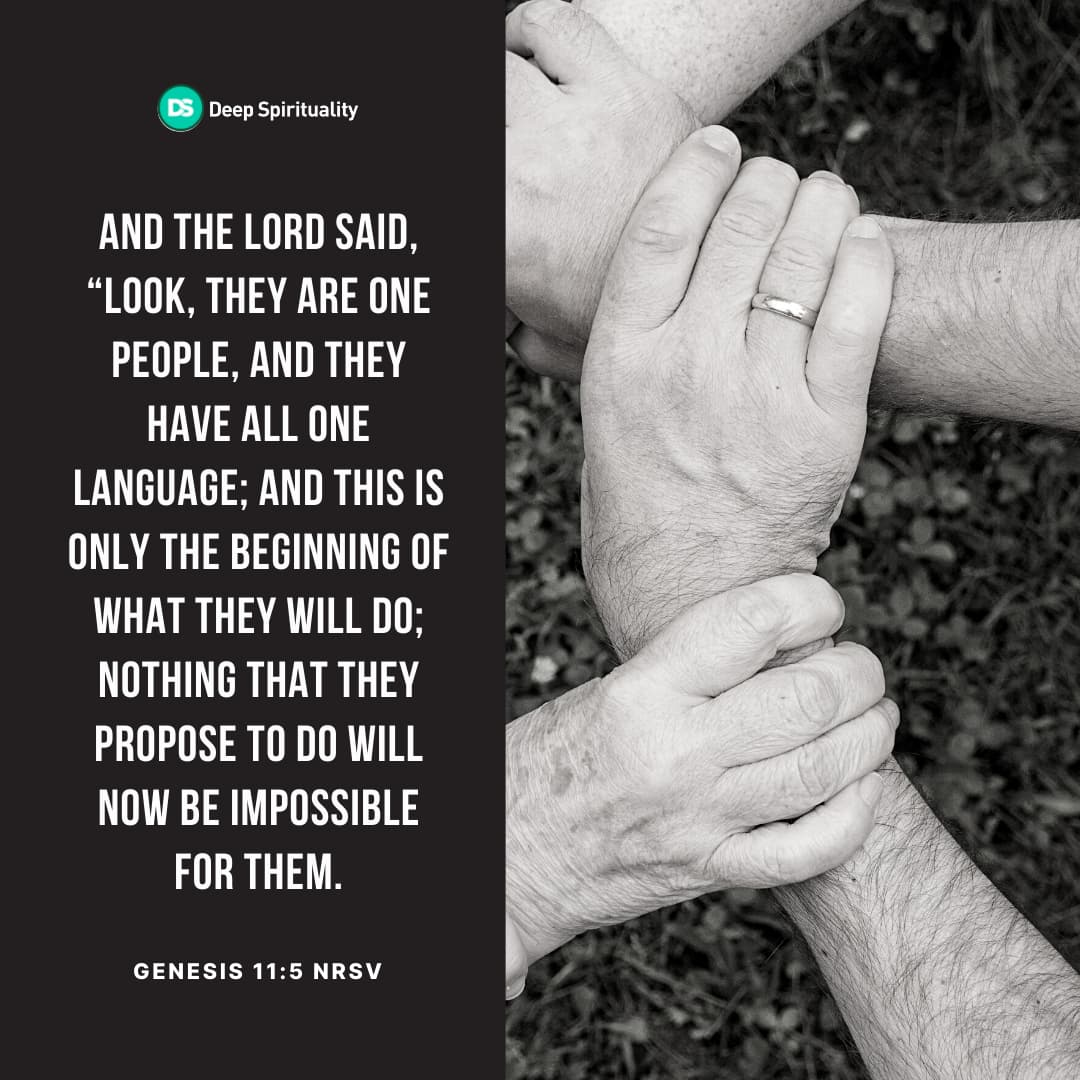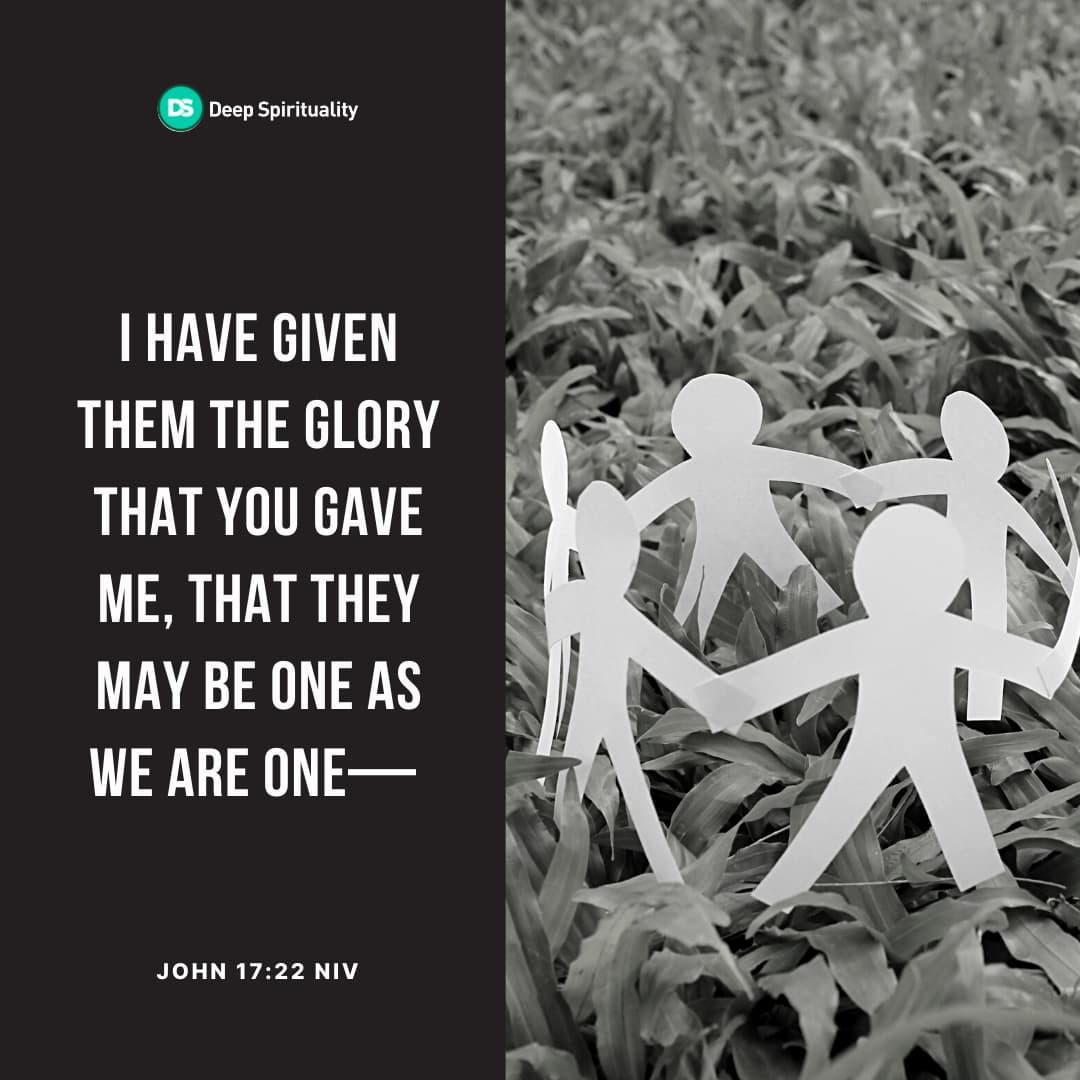Now the whole earth had one language and the same words. [2] And as they migrated from the east, they came upon a plain in the land of Shinar and settled there. [3] And they said to one another, “Come, let us make bricks, and burn them thoroughly.” And they had brick for stone, and bitumen for mortar. [4] Then they said, “Come, let us build ourselves a city, and a tower with its top in the heavens, and let us make a name for ourselves; otherwise we shall be scattered abroad upon the face of the whole earth.” [5] The LORD came down to see the city and the tower, which mortals had built. [6] And the LORD said, “Look, they are one people, and they have all one language; and this is only the beginning of what they will do; nothing that they propose to do will now be impossible for them.
Genesis 11:1-6 NRSV
The Tower of Babel in Genesis 11 is a cautionary tale.
It contains a couple of very interesting truths. First, if human beings learn to be one people and speak one language, nothing will be impossible for them.
But the people in this story had a dream that didn’t involve God. It was about self-promotion, which leads us to the second truth of this story: one of the biggest reasons the dream of a united people will fail is if their motive is in opposition to the will of God.
For some context, let’s look at a little backstory about the Tower of Babel. Why would God stop these people from doing the impossible?
The answer lies in their motive. In Genesis 11:2, we see that the people “settled” in a plain. A few chapters earlier, God had told them to spread out, to go fill the earth (Genesis 9:1) as the floodwaters receded in the days of Noah. He promised them he would never flood the earth again.

But when the people decided to settle and build a tower that reached up to heaven, they were essentially saying, “No.” Instead of spreading out, they wanted to settle. Instead of trusting God, they wanted to build a tower that was tall enough to help them reach heaven themselves. They wanted to do things their own way.
So how does this story apply to us today?
Many of us as Christians want to be able to do the impossible. We want to change lives (including our own) and bring the message of a relationship with God to as many people as possible.
But we don’t always realize that the power to do the impossible lies in a rarely-mentioned word: unity. Only when we learn to sustain unity with God and with each other will we see our dreams come true.
Complete unity helps people believe in God
When Jesus came to earth, he gave human beings the gospel and with it the ability to be one people with one spiritual language:
“My prayer is not for them alone. I pray also for those who will believe in me through their message, [21] that all of them may be one, Father, just as you are in me and I am in you. May they also be in us so that the world may believe that you have sent me.
John 17:20-21 NIV
Jesus also tells us one of the reasons unity matters — so that the world may believe. Our connection with God and each other has a direct correlation to the kind of impact we can make on people around us.
Think of some of the inspiring movies you’ve seen about teamwork, like Remember the Titans or the Avengers. These movies move us because we see what happens when a group of people put aside their differences and personal agendas to come together as one.
Divided, they’re weak and easily defeated. But united, they’re strong and shine brightly against forces of darkness around them.

Likewise, as Christians, it’s important that we avoid splintering over our personal agendas or desires. If we can’t get along with each other, how will people believe we have something incredible to offer?
Unity inspires. It’s powerful, and it helps us win victories and shine brightly to the world around us.
Reflection questions
- What’s your attitude toward unity and teamwork?
- Is being unified with people around you easy or difficult for you? Why?
Why sustained unity is rare in churches
Having a church or fellowship of churches capable of sustaining unity long enough to experience the impossible is a rare occurrence. Most of us have probably seen, heard of, or been part of a church split. This failure of unity is why so few churches experience the fulfillment of their impossible dreams and destiny.
What unravels the unity of God’s people is almost always a spiritual rather than organizational problem. Unfortunately, on most occasions, churches focus on the organizational to the neglect of the spiritual.
Unity requires talking about what’s in the heart, not just what we see:
Are we commending ourselves to you again? No, we are giving you a reason to be proud of us, so you can answer those who brag about having a spectacular ministry rather than having a sincere heart.
2 Corinthians 5:12 NLT
To be unified on a heart-level, we have to go beneath the surface and talk about our motives. You can do a lot of good deeds and have a spectacular-looking ministry, but it won’t last if it’s driven by motives that stand in opposition to the will of God — like self-promotion, self-glorification, or selfish ambition.
Unity is about connection, not conformity
I have given them the glory that you gave me, that they may be one as we are one— [23] I in them and you in me—so that they may be brought to complete unity. Then the world will know that you sent me and have loved them even as you have loved me.
John 17:22-23 NIV
The kind of unity Jesus talks about is not the same as conforming or complying with what someone else wants you to do. I often confuse these concepts, and think that I’m “unified” because my behavior is falling in line with what I think people expect of me. I think that because I have perfect attendance at church, I read my Bible regularly, and I’m not in any big conflicts with people, I must be unified … right?
Actually, unity is about being “joined” together. It’s deeper than behavior, and sometimes when I just “do the right thing” it masks that my heart is actually not unified with God or spiritual people around me.
Jesus is talking about being one with him the way he is one with God. This kind of unity is about a close relationship, in which you are deeply connected with Jesus and desire the same things he desires.
Jesus compares this connection to the way a branch is joined together to a vine:
Remain in me, as I also remain in you. No branch can bear fruit by itself; it must remain in the vine. Neither can you bear fruit unless you remain in me. [5] “I am the vine; you are the branches. If you remain in me and I in you, you will bear much fruit; apart from me you can do nothing.
John 15:4-5,9-10 NIV
We, the “branches,” need to be joined or unified with Jesus if we want to produce fruit in our lives.
Some questions we can ask ourselves to reflect on our unity with Jesus are:
- Do I make conscious choices to make the Bible my standard for living? Am I willing to change something I’m doing if I see it’s not in line with the Scriptures? (John 15:10)
- Am I hungry to keep growing and becoming more like Jesus? (John 13:34-35)
- Do I sustain and spread a passion for doing good? (Acts 10:38)
- Do I sustain and spread a passion for loving God? (Matthew 22:37-40)
- What are some areas I’m content to settle for conformity instead of making sure my heart is unified with God?
As we grow in our unity with God, our unity with people around us will grow too. We’ll find ourselves on the same page with our spiritual friends because we share the same convictions. Together, with God and each other, nothing will be impossible for us and we’ll see our spiritual dreams come true.




